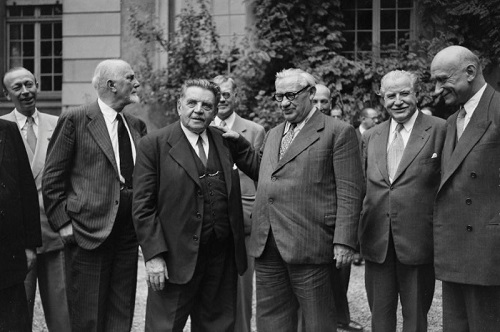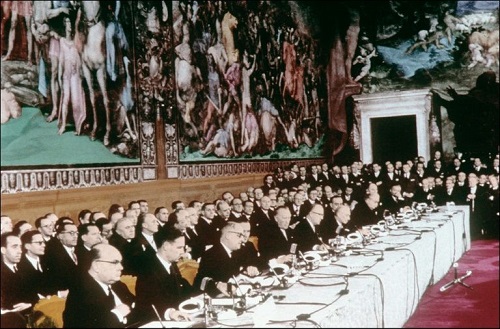ATLANTA
(AP) — America's first new nuclear plants in more than a decade are costing
billions more to build and sometimes taking longer to deliver than planned,
problems that could chill the industry's hopes for a jumpstart to the nation's
new nuclear age.
 |
The
Process: From Atom to Outlet
|
Licensing
delay charges, soaring construction expenses and installation glitches as
mundane as misshapen metal bars have driven up the costs of three plants in
Georgia, Tennessee and South Carolina, from hundreds of millions to as much as
$2 billion, according to an Associated Press analysis of public records and
regulatory filings.
Those
problems, along with jangled nerves from last year's meltdown in Japan and the
lure of cheap natural gas, could discourage utilities from sinking cash into
new reactors, experts said. The building slowdown would be another blow to the
so-called nuclear renaissance, a drive over the past decade to build 30 new
reactors to meet the country's growing power needs. Industry watchers now say
that only a handful will be built this decade.
"People
are looking at these things very carefully," said Richard Lester, head of
the department of nuclear science and engineering at the Massachusetts
Institute of Technology. Inexpensive gas alone, he said, "is casting a
pretty long shadow over the prospects" for construction of new nuclear
plants.
The AP's
review of pending projects found:
— Plant
Vogtle in eastern Georgia, initially estimated to cost $14 billion, has run
into over $800 million in extra charges related to licensing delays. A state
monitor has said bluntly that co-owner Southern Co. can't stick to its budget.
The plant, whose first reactor was supposed to be operational by April 2016, is
now delayed seven months.
— The
long-mothballed Watts Bar power plant in central Tennessee, initially budgeted
at $2.5 billion, will cost up to $2 billion more , the Tennessee Valley
Authority concluded this spring. The utility said its initial budget
underestimated how much work was needed to finish the plant and wasted money by
not completing more design work before starting construction. The project had
been targeted to finish in 2012, but has been postponed until 2015.
— Plant
Summer in South Carolina, expected to cost $10.4 billion, has seen costs jump
by $670 million; but with lower interest rates and cheaper-than-expected labor;
the owners assert the project is still on or under budget. A deadline to put
the first new reactor online has been delayed from 2016 to 2017; the second
reactor is now eight months ahead of schedule, targeted for early 2018.
Southern
Co. and others in the nuclear business say cost overruns are expected in
projects this complex, and that they are balanced out by other savings over the
life of the plant. Southern Co. expects Plant Vogtle will cost $2 billion less
to operate over its 60-year lifetime than initially projected because of
anticipated tax breaks and historically low interest rates.
Regulators
have been trying to make it easier to build, encouraging the use of
off-the-shelf reactor designs that get approval in advance. New construction
techniques are supposed to require less in-the-field assembly, making building
quicker and reducing human error. Interest rates and labor costs have been down
after a bruising recession.
"It's
a down environment economically," said Steve Byrne, president of
generation and transmission for SCANA's South Carolina Electric & Gas Co.,
one of the utilities building Plant Summer's reactors. "It's terrible for
the country, but it's a great time to be building" a nuclear facility.
But the
economy is also working against progress on new construction. The next company
in line to build, Progress Energy, has pushed back construction plans for two
reactors in Florida because of the economy, low demand and extremely cheap
natural gas. It expects its first new reactor to be finished in 2024.
The plants
burning natural gas are far cheaper to build than nuclear power plants. But
utility executives say they need a diversified mix of power plants, including
nuclear, because relying too heavily on a single fuel like natural gas
backfires if prices go up.
The rising
construction costs hit an industry already under financial pressure, after
meltdowns last year at the Fukushima Dai-ichi nuclear plant after a tsunami in
Japan. NRG Energy wrote off a $481 million investment in two planned reactors
in Texas shortly after the accident, citing uncertainties after the Japanese
disaster. Other utilities still seeking to build have said they expect the U.S.
Nuclear Regulatory Commission will adopt new safety rules in response to the
accident; they cannot predict the exact costs.
Industry
leaders say the soaring costs could threaten projects that are worth the
investment, and send the wrong message to the public.
"It's
important to get this project done right because if every time we build a
nuclear plant we go substantially over budget, ratepayers will begin to believe
we can't do a nuclear project on budget," said Tim Echols, a nuclear power
proponent who chairs Georgia's Public Service Commission.
An earlier
push to expand the reach of nuclear power in the 1970s was thwarted by a number
of obstacles: Electric companies overestimated demand and designed plants they
didn't need. They had trouble managing massive construction workforces.
Utilities designed nuclear plants as they built, leading to mistakes and
slowdowns. Interest rates skyrocketed and the 1979 meltdown at the Three Mile
Island nuclear plant in Pennsylvania forced plant operators to meet new rules
at additional costs.
To win
approval to build at Plant Vogtle, Southern Co. had to promise it would build
its plant on budget, particularly as state officials remembered the massive
cost overruns that occurred when it built the plant's two existing reactors,
said Robert Baker, a former utility regulator who has criticized the project.
The utility
has been authorized to spend just over $6.1 billion as its share of the
estimated $14 billion project, which was tracking under budget at the end of
last year.
Southern
Co. is about seven months behind schedule, mostly because of the federal
approval process for the reactor, according to company executives and filings.
Southern Co. also faced delays in getting an important license allowing it to
start building the guts of the plant.
Another,
less exotic problem at Vogtle: At one point, workers built metal bars straight
rather than curved, as regulators had directed, so Southern Co. had to rip them
out and replace them. Crews in South Carolina, watching the progress at Vogtle,
have halted the construction of those bars.
Plant
Vogtle's designers and builders — Westinghouse Electric Co. and The Shaw Group
Inc. — want Southern Co. to pay an additional $400 million for the licensing
delays, according to a May report filed with the U.S. Securities and Exchange
Commission. Southern Co. subsidiary Georgia Power, which owns nearly half the
new plant, denies responsibility for those costs and is negotiating on behalf
of all the owners. Financial information divulged by three companies who own 98
percent of the project show $838 million in potential charges.
It is
unclear how much this could cost the utility's 2.4 million customers. Southern
Co. earlier estimated typical residential customers would see a $10 increase in
their monthly bills when both reactors are producing power in 2018. Utility
regulators ultimately set the rates.
Similar
issues have played out in central South Carolina, where SCANA Corp. and Santee
Cooper won permission to build two reactors at Plant Summer, about 25 miles
north of Columbia. SCANA agreed to pay $138 million in March to settle claims
over licensing delays raised by the companies designing and building the
reactor. Santee Cooper will pay nearly $113 million as its share of those
costs, company officials said.
In May,
SCANA asked utility regulators to raise its base spending on the project by
$283 million, which includes the settlement related to licensing delays and
extra costs for cyber security and staffing. However, the company said it will
stay within its existing budget because it expects other expenses to be lower.
Supplying
parts efficiently for the new reactors has also proved difficult. William
Jacobs Jr., the state monitor hired by Georgia utility regulators, has publicly
questioned whether a factory run by The Shaw Group can master quality control
rules and deliver parts on time. NRC inspectors have faulted the facility for
failing to maintain accurate records on the qualifications of workers. SCANA
Corp. raised similar concerns.
Shaw
spokeswoman Gentry Brann said the company has addressed the NRC's concerns.
In
Tennessee, internal reviews faulted the Tennessee Valley Authority for not
providing enough oversight on the project and for allowing a culture to develop
that discouraged the sharing of bad news, for example, site problems that led
to delays. Not enough engineering work was finished before construction
started, meaning construction workers sometimes did not have enough work to do.
In an
embarrassing episode, the TVA temporarily stopped work at the site in January
after two mishaps revealed safety problems. No one was injured, and the
operating plant did not experience any problems. In one case, workers removed a
cable connected to equipment in the working reactor. In another, they cut out
valves before getting proper clearance and verifying the system was safe.
Changes
have been made to bring the project under control, said Mike Skaggs, who became
the authority's senior vice president of nuclear construction in October. He
said the TVA has carefully evaluated the remaining work on the reactor, slimmed
down its workforce and made instructions to work crews easier to understand.
Skaggs has
been involved in building two other nuclear plants and said the project
requires constant monitoring.
"If
you've got a good estimate, you use the estimate as a roadmap to complete the
project," Skaggs said. "What I'm most worried about is the
assumptions we've made in the estimate — are they ringing out true?"
Related Articles:
"Update on Current Events" – Jul 23, 2011 (Kryon channelled by Lee Carroll) - (Subjects: The Humanization of God, Gaia, Shift of Human Consciousness, 2012, Benevolent Design, Financial Institutes (Recession, System to Change ...), Water Cycle (Heat up, Mini Ice Ace, Oceans, Fish, Earthquakes ..), Nuclear Power Revealed, Geothermal Power, Hydro Power, Drinking Water from Seawater, No need for Oil as Much, Middle East in Peace, Persia/Iran Uprising, Muhammad, Israel, DNA, Two Dictators to fall soon, Africa, China, (Old) Souls, Species to go, Whales to Humans, Global Unity,..... etc.)
"Recalibration of Free Choice"– Mar 3, 2012 (Kryon Channelling by Lee Caroll) - (Subjects: (Old) Souls, Midpoint on 21-12-2012, Shift of Human Consciousness, Black & White vs. Color, 1 - Spirituality (Religions) shifting, Lose a Pope “soon”, 2 - Humans will change react to drama, 3 - Civilizations/Population on Earth, 4 - Alternate energy sources (Geothermal, Tidal (Paddle wheels), Wind), 5 – Financials Institutes/concepts will change (Integrity – Ethical) , 6 - News/Media/TV to change, 7 – Big Pharmaceutical company will collapse “soon”, (Keep people sick), (Integrity – Ethical) 8 – Wars will be over on Earth, Global Unity, … etc.)












No comments:
Post a Comment
Note: Only a member of this blog may post a comment.